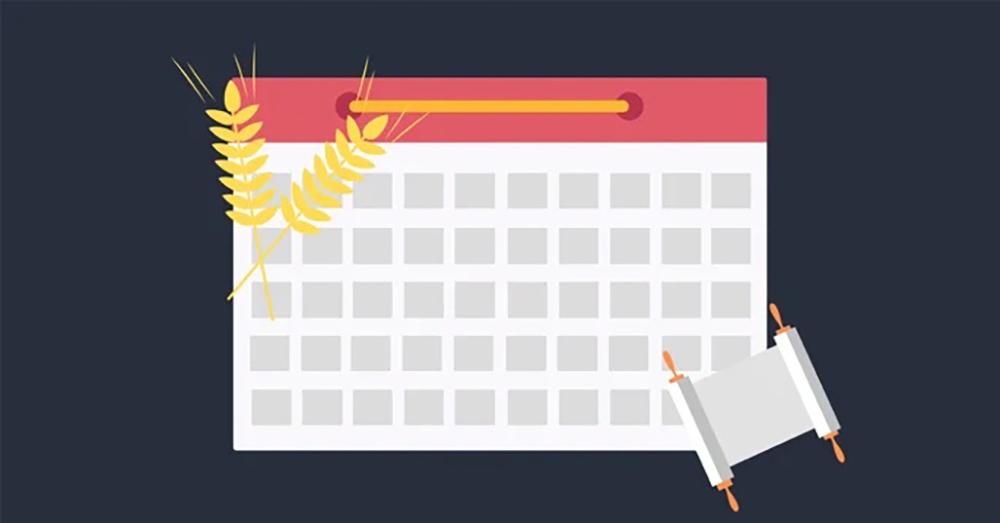From the Book of Our Heritage
By: Chabad.org
The Biblical Command to Count the Omer
The Torah writes: “And you shall count for yourselves from the morrow of the Shabbat, from the day that you bring the omer [offering] that is raised, seven complete weeks there shall be until the morrow of the seventh week you shall count fifty days (Leviticus 23:15-16).
These verses command us to count seven weeks from the time that the omer, the new barley offering, was brought in the Temple, i.e., from the sixteenth of Nissan. We begin our count on the second night of Passover (the night of the second Seder in the Diaspora) and continue until Shavuot, which is the fiftieth day after the offering.
We actually count forty-nine days, for our Sages had a tradition that the Torah’s use of the word fifty meant until the fiftieth day.
It is a mitzvah for each individual to count the days of the omer by himself, for the Torah states: And you shall count for yourselves. This mitzvah is applicable today even though the Holy Temple no longer stands and we no longer bring the omer offering. Some maintain that the obligation today is Rabbinic.

When to Count the Omer
The correct time for counting the omer is at the beginning of the night, for the verse states that we are to count seven complete weeks and the count can be complete only if we commence when the sixteenth of Nissan begins.
Since we commence counting the omer at night, we continue to count at night throughout the entire forty-nine days.
We first recite the evening prayers, for the mitzvah of Ma’ariv and of saying the Shema is obligatory every day and a mitzvah that is frequently obligatory takes precedence over a mitzvah that is performed less often.
Immediately after the Amidah, we count the omer. If one neglected to count then, he may count throughout the night; and if he forgot to count at night, he may count during the day, but without the blessing.
How to Count the Omer
We first recite the blessing on counting the omer “Who has commanded us to count the omer”] and then count, saying: “Today is the… day of the omer” Some congregations have a custom of saying baomer, in the omer, while others have a custom of saying laomer, of the omer. On the first night one says: “Today is one day of the omer” and on the second night one says: “Today is two days of the omer”
This practice is followed until the seventh day, when we make a slight change and say: “Today is seven days which is one week of the omer”.
Congregations that follow the Sephardic rite say: “Today is the seventh day of the omer which is one week”; i.e., the word omer is always juxtaposed to the number of the day rather than to the concurrent count of weeks.
From the seventh day on, one adds the count of weeks to the count of days; e.g., “Today is eight days which is one week and one day of the omer” and the Sephardic wording is “… eight days of the omer which is one week and one day.”
If one made a mistake and neglected to count either the days or the weeks, he must count again but does not recite another blessing..
When counting, one should be careful to use the correct grammatical form (e.g., using the word yamim, days, until ten and then yom from that point on, and using the masculine form for the count of the weeks].
The blessing and the counting should be said while standing, for the verse (Deuteronomy 16:9) states: When the grain is standing in the fields. But if one sat while counting, he has nevertheless fulfilled the obligation.
After counting the omer, it is customary to say: “May it be Your will that that the Beit haMikdash be rebuilt speedily in our days.”

More Details Regarding Sefirat HaOmer
The count is to be made at the beginning of the night, i.e., as soon as three stars appear. If one counted earlier [but after sunset], he is not required to count again, but nevertheless it is proper to do so, albeit without a blessing, after the appearance of the stars.
If one is asked what is the proper count for that night: If the person being asked has not yet counted himself, he should not say the number of that night for he will in effect have counted the omer without saying a blessing and he will be unable to count again with a blessing.
Rather, he should say: “Last night was such and such.” One should be especially careful on Lag baOmer, the thirty third night of the omer, for it is quite common to refer to that day by its number.
Before reciting the blessing one should know the number of the day. However, if one recited the blessing without being aware of the number and added the number only after having heard it said by someone else, he has fulfilled the obligation.
If one thought that he knew the number of the day when he recited the blessing but realized that he was mistaken after hearing it said by others, he may still count and need not repeat the blessing.
If he recited the blessing and then counted the wrong number: If he remembered within about 18 seconds and he did not say anything else before realizing his mistake, he may count the proper number without repeating the blessing. And if not, it is considered as if he has not counted, and he recites the blessing and counts anew.
If he neglected to count one day [i.e., both at night and on the following day], or if he counted the wrong number, he may no longer recite a blessing when he subsequently counts but he must nevertheless continue to count. However, if he does not remember whether he counted or not, he may continue to count the remaining days of the omer with a blessing.
It is customary that following the counting of the omer, one recites Psalm 67, for according to tradition that psalm has forty nine words, corresponding to the days of the omer
In the Diaspora, where a second Seder is conducted on the night of the sixteenth of Nissan, some have the custom to count the omer at the end of the Seder. Were we to count before the Seder, we would declare the day as the sixteenth of Nissan, and the second Seder, which is held because of a doubt that the date might really be the fifteenth, would seem to be superfluous.
It is customary among the pious and righteous to read the Torah portion which deals with the omer, at the conclusion of the Seder, in Eretz Yisrael, and at the conclusion of the second Seder in the Diaspora.
By reading the portion, it is as if we were fulfilling the obligation of bringing the offering, as per the Sages’ dictum that “our lips are our service.” In many Sephardic communities in Israel, it is customary to read this portion before the first counting of the omer.
Excerpted from: The Book of Our Heritage. Published and copyright by Feldheim Publications.



